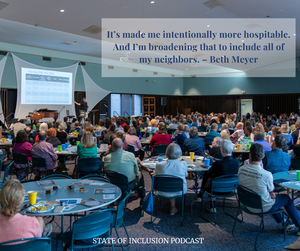Episode 88, 38 min listen
In this episode, we pause to express gratitude and reflect on the lessons learned through nearly a year of intentional engagement on immigration justice, in partnership with Village Engage and the Greenville Immigration and Faith Coalition. Listen in as our team explains how this journey has changed us and check out some of the photos from moments of community engagement.
AUDIO PLAYER
You can access this episode wherever you listen to podcasts via our pod.link.
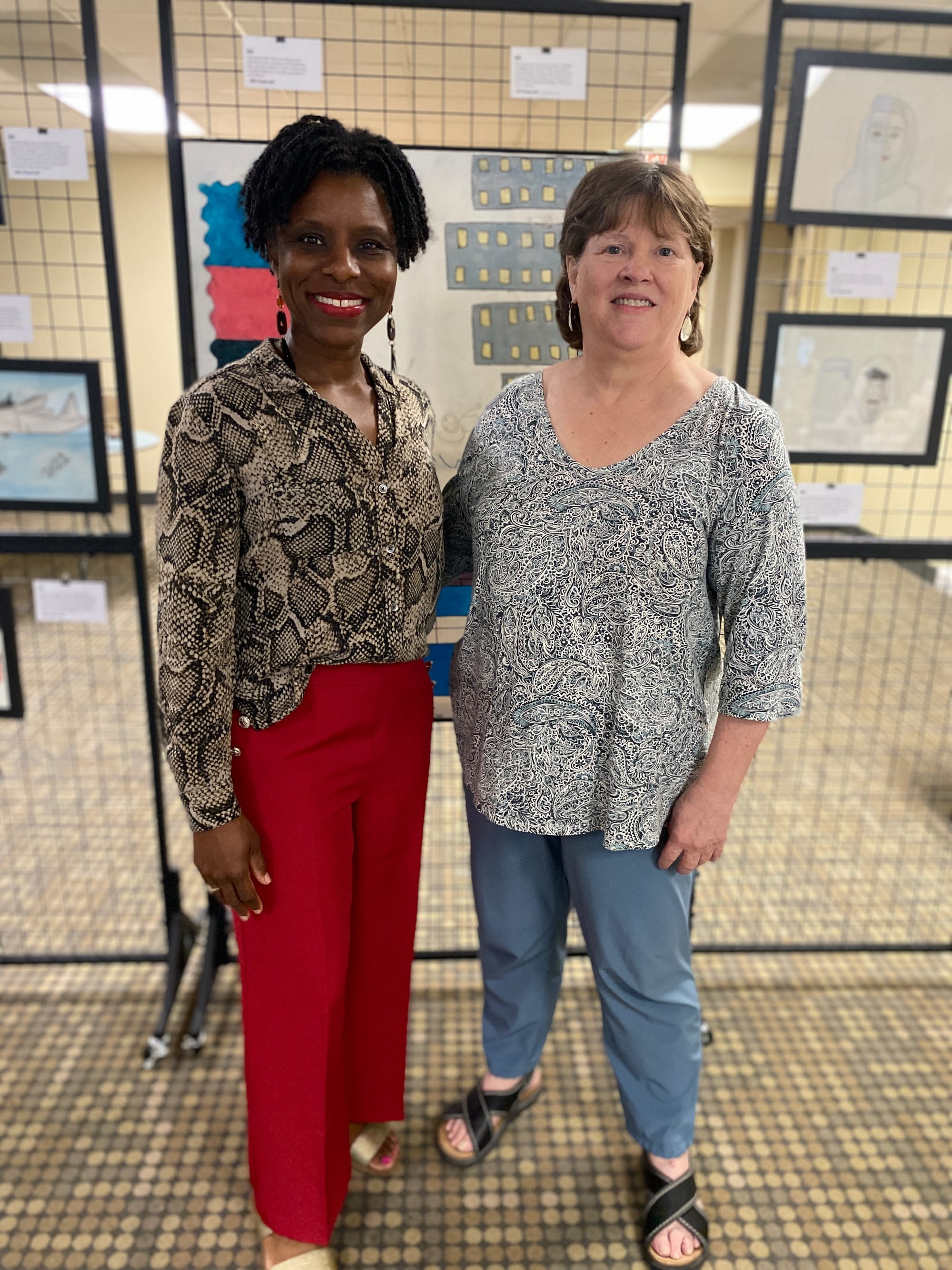
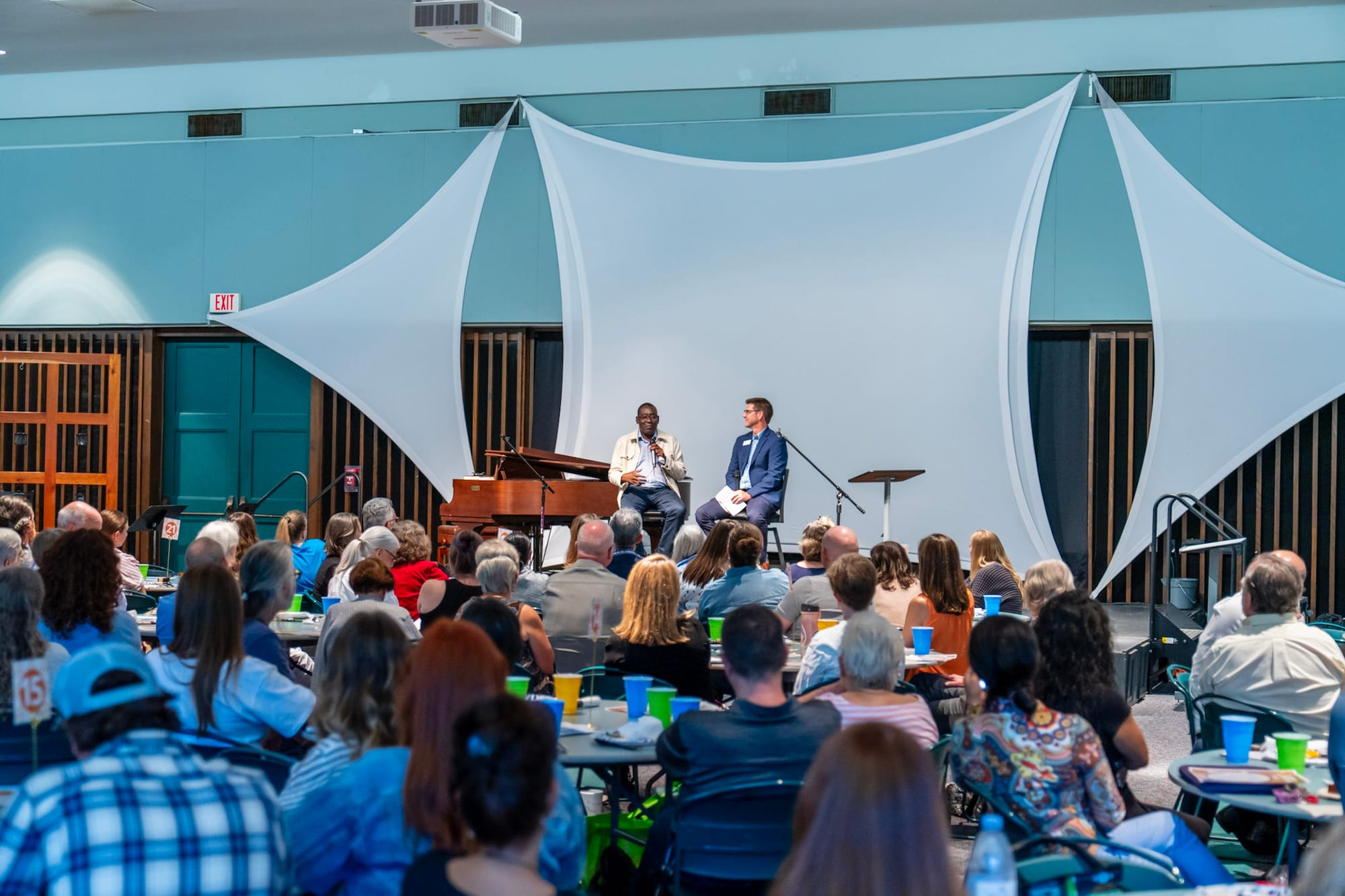
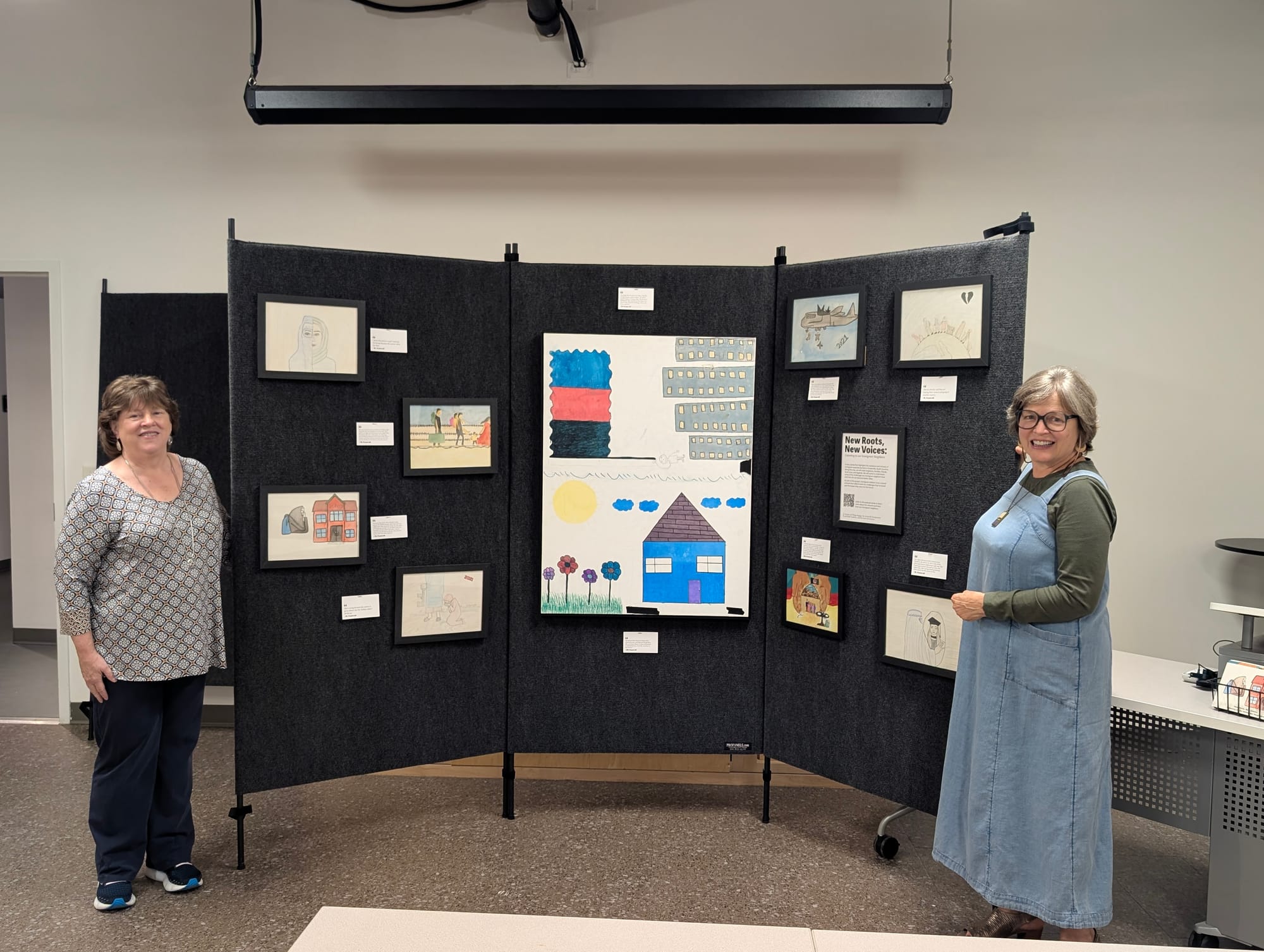
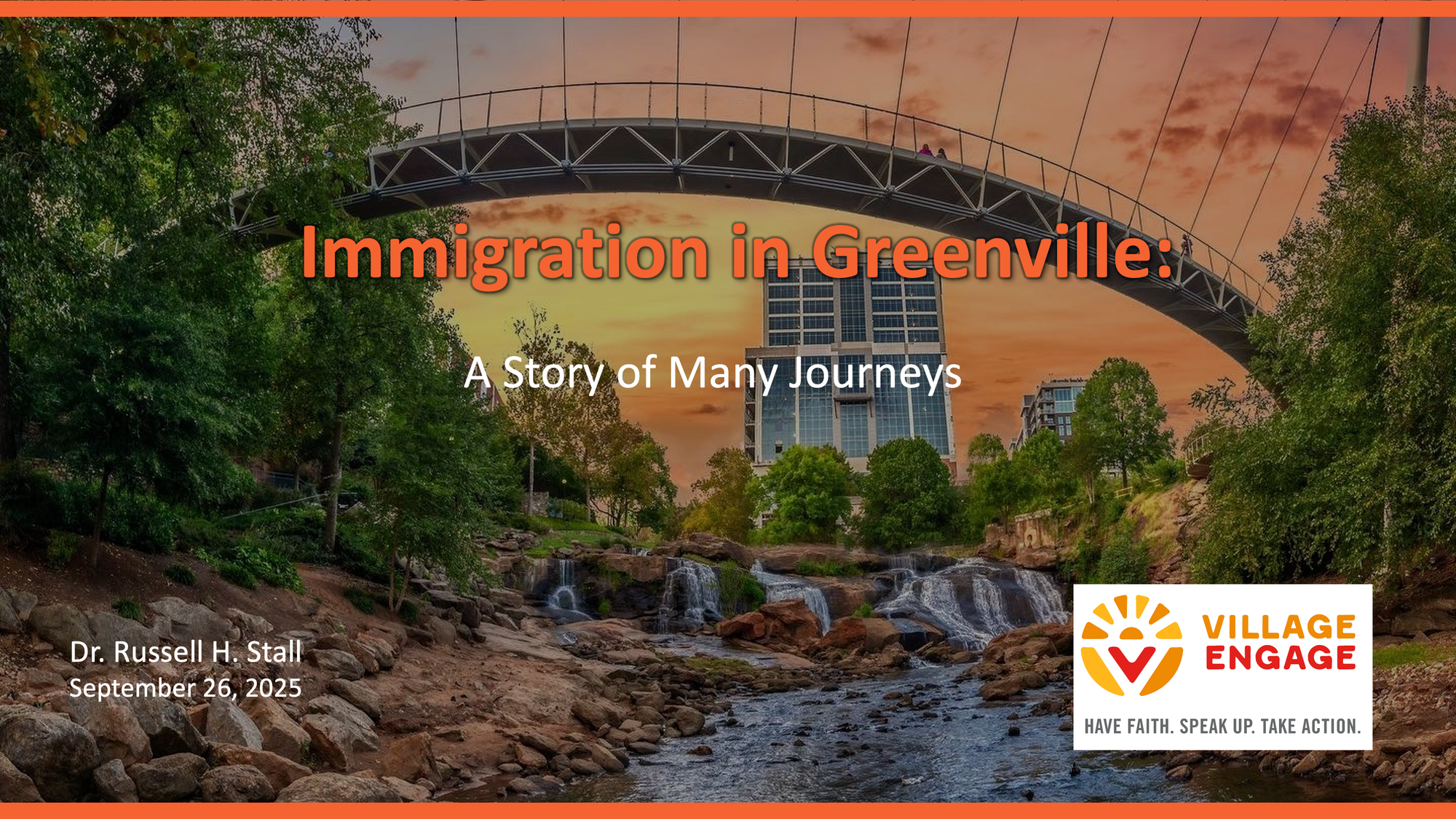
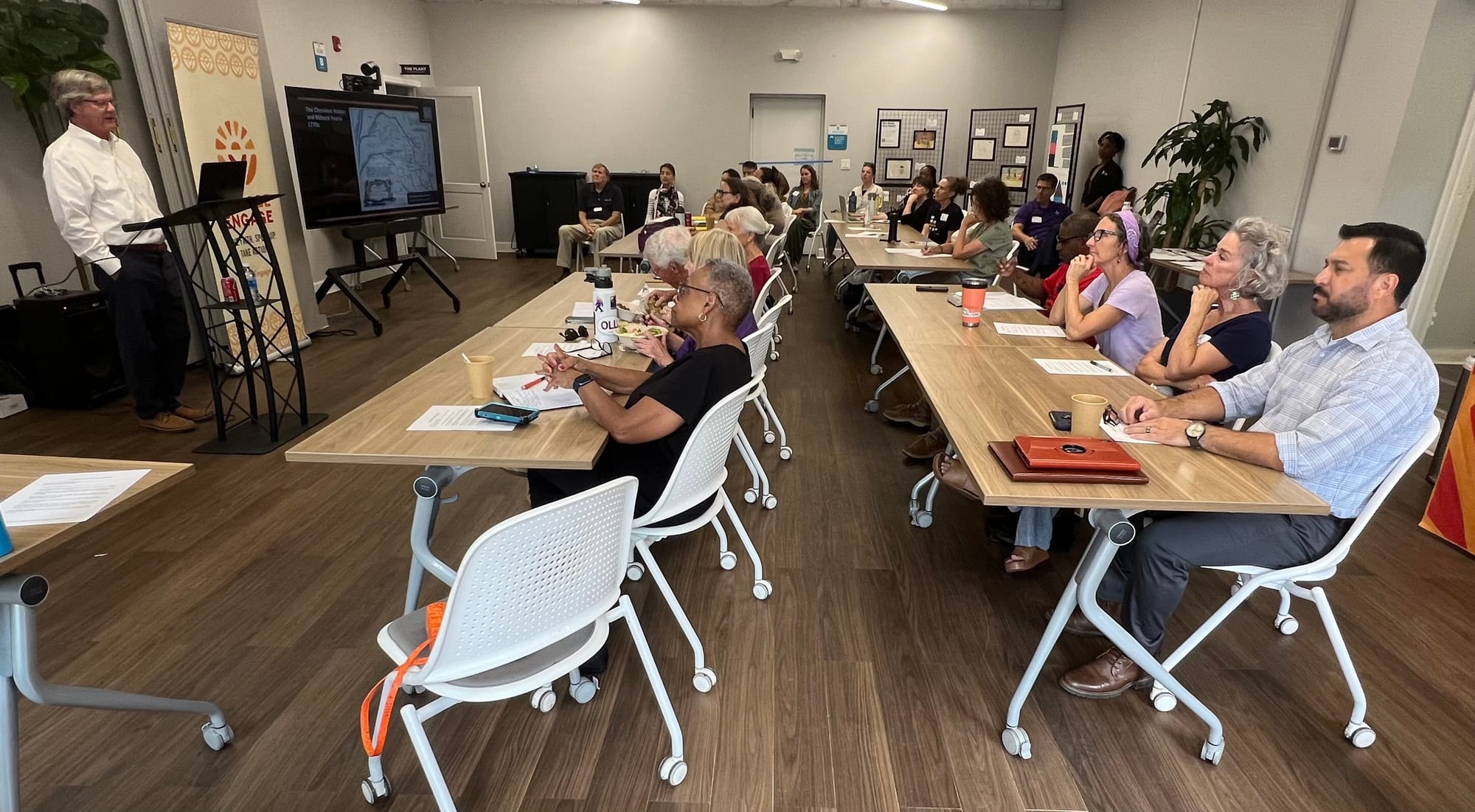
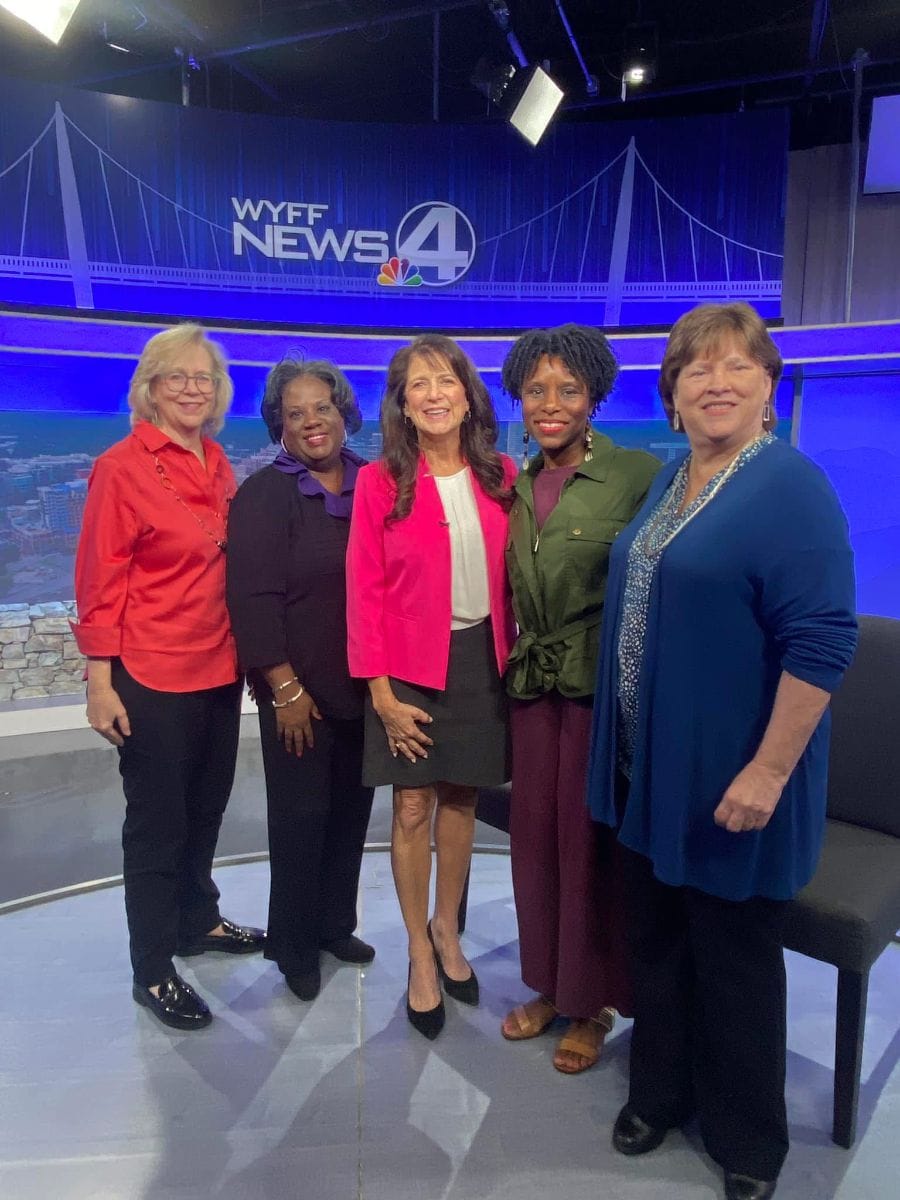
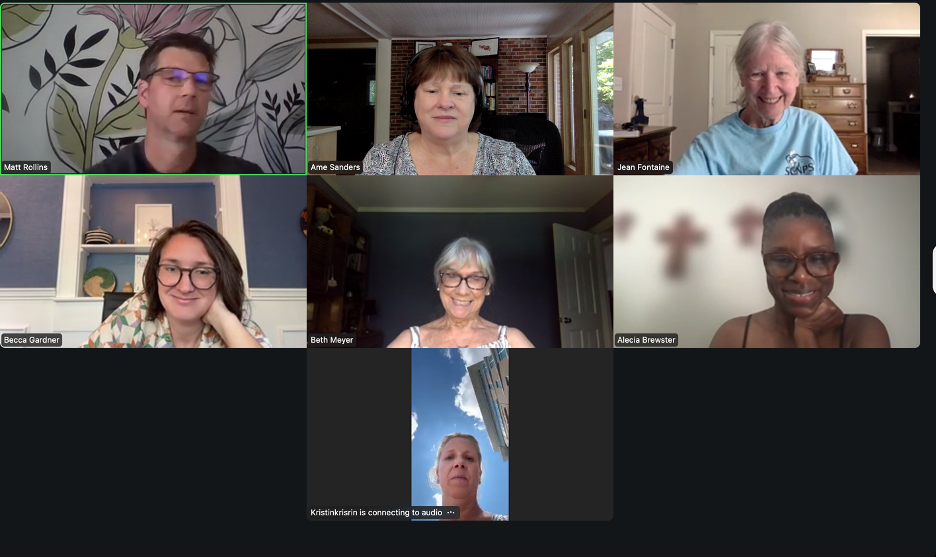
It's been a busy year! Photos of just some of our team's activities: Ame & Alecia Brewster at our youth art display + our 2nd community immigration dinner + Ame with Victoria Change and art display at My Neighbor's Voice event + Dr. Russell Stall at Village Engage 4th Friday discussion on Greenville's Immigrant History + a series shout-out during WYFF 4 The Record Sunday morning show featuring Village Engage (Susan Stall, Rep. Chandra Dillard, Stephanie Trotter, Alecia Brewster, Ame) + our story-sharing team also spent a lot of time together on Zoom.
ADDITIONAL REFERENCES
This immigration series is done in partnership and collaboration with:
- Village Engage
- Greenville Immigration and Faith Coalition
FULL TRANSCRIPT
-Introduction
[00:00:00] Ame Sanders: This is the State of Inclusion podcast, and I'm Ame Sanders. There is a lot in the news every day about immigrants. And a lot of it is negative. What if we went beyond the news? What if we opened our hearts and our minds to better understand the reality of immigrants in our own community? Over the next several weeks, we will listen to and lift up the voices and stories of local immigrants here in Greenville, South Carolina.
Along the way, we will meet neighbors, families, friends, local icons, and legends. We will come to understand some of the challenges our immigrant neighbors face and how we can become better allies. Welcome to this very special series, New Roots, New Voices: Listening to Our Immigrant Neighbors.
I am grateful that so many of you have followed along with this series on immigration justice. It has truly been a journey for me and the opportunity to get to know more of my immigrant neighbors and lift up their stories has been a blessing for me personally, and I hope it has had a positive impact on you as well.
These are difficult times for immigrants in our country. I'm so grateful to the guests who were willing to speak up and speak out. It's never easy to make yourself vulnerable and to share your personal story publicly. But it is especially challenging for our immigrant neighbors in this day and time. I am also grateful to the story-sharing team that worked so hard to help put this all together.
So I want to say thank you, Becca Gardner, Jean Fontaine, Beth Meyer, Tricia Stanford, Matt Rollins, Kristin Lewis, Alecia Brewster, and a special thank you to Wendy Linn, who provided trusted connections with the local immigrant community and who also brought our art project to life with the young Afghan artists.
In addition to a chance to say thank you, this episode is an opportunity to reflect on the learnings through nearly a year of engaging intentionally on immigration justice. I am so grateful for Alecia Brewster's leadership and work in our community through Village Engage. She and Village Engage held the space
our team and our community needed to be able to come together around immigration, justice, and begin to find paths to meaningful action.
So today we are happy to welcome Alecia Brewster. Alecia is Program Director for Village Engage, a sponsor and partner in our immigration justice series. New Roots, New Voices.
Welcome, Alecia.
Good morning. How are you doing, Ame?
Great. Thank you for coming.
Thank you.
-Our Journey
So, Alecia, we've been on a little bit of a journey together here in the last months. So our just faith immigration classes started this past winter, at least. Mine started, I guess in February, you know, when I accidentally signed up for a class. You remember that part? A lot's happened since those of us first signed up for our classes. Can you talk a little bit about this experience from your perspective? The journey from a few just faith, immigration classes to where we find ourselves today.
[00:03:27] Alecia Brewster: Yeah, well, Ame, like you our class started in Jan, uh, February, February as well.
So as your group was getting started, our group started maybe the week after that. And like you and all of the rest of us, we were getting so much information, you know, coming from national, headlines about the policies and the direction that the new administration was taking around immigration and really, you know, beginning to use some different types of enforcement programs.
And the class really did help to help us, kind of get grounded first and foremost, um, because I think it, with all of the news, you know, headlines, it could be easy to just feel very, very overwhelmed by everything that was coming out. But I think that that class really helped to ground us. To understand and to see that, you know, what we're experiencing now is not necessarily new, but a lot of the tactics and um, even the messaging has been used in the past and we were able to, I think, do a lot of kind of connecting, um, what was happening current happening currently with what had happened in the past.
And what I love about the process is that because there were more than, um, you know, one or two groups going through this, there were also other initiatives in the community that were already starting to take shape as things were bubbling up, that we were all able to find a way to come together. And I really love that, you know, in the midst of this current injustice happening, that we were all able to find each other at that first big event, community event that we have the, um, Faith and Immigration Workshop, dinner. And that really was a catalyst for a lot of the work that we have been engaged in over the past, um, several months. So, you know, it was unexpected. Um, like you, I didn't know what I was getting into when I, you know, offered to host a Just Faith, immigration class at Mill Village, but I'm really, I feel grateful that I've been able to, to play a small part in the work that we've been able to do to address concerns and gaps in the community for our immigrant and refugee neighbors.
-Community Engagement and Impact
[00:05:57] Ame Sanders: So, talk a little bit about the group that's kind of formed out of this experience, and then also how you see that having an effect in the community.
[00:06:09] Alecia Brewster: Let's see. We call it the Greenville Immigration and Faith Coalition, and this group came together after the Just Faith classes and the immigration workshop.
It was very organic and grassroots in the way that it started. It was essentially people who cared a lot about the people who were being directly impacted and knew that together we could be a whole lot more effective in not only keeping, you know, one another encouraged and moving forward, but that our resources put together could be so much more significant.
So some of the ways that that group has been able to work together to respond includes a lot of education we've been able to put on another immigration workshop, immigration and faith workshop that gave information about what was really going on with our current system, the way that, you know, immigrants are, um, processed through our national program. And, we were also able to, you know, have these two working groups kind of working on their projects and, in particular, the project that you've been leading, Ame, around collecting stories, um, of our immigrant and refugee neighbors here. And I think just. Helping people understand that there's so much nuance to our neighbors in our community.
Their stories, their journeys, are also very different. But I think the thing that really comes out from your, your, um, series, or not your, your series, but the, um.
[00:08:03] Ame Sanders: New Root, New Voices: Listening to Our Immigrant Neighbors.
[00:08:06] Alecia Brewster: Yes. That series is that the common thread is this real sense of hope, I think, and this love for their family. and also many of them expressing this love for this community and wanting to just be a part of helping to make it better. And I think that's a story that doesn't come out in the national headlines. You know, we hear all of the negative things, but we don't hear about the contributions that immigrants and, and of all of us of course, um, unless we're an indigenous person is an immigrant from some point in history. But, you know, there's this common theme of really wanting to contribute to creating a community that's inclusive and that everybody has a place in.
-Making Connections
[00:09:03] Ame Sanders: One of the things that was interesting for me, and I guess I'll ask your comment about it in a second, is that we started out as a group of folks who don't think of ourselves as immigrants.
We have maybe have immigration in our history. Mm-hmm. Some of the folks were involved with immigration justice work before. Some of us, like myself, were not. And it started as a group of folks who wanted to learn more, understand more about what was happening in the community, but also to begin to learn how to be better allies and how to better support our immigrant community.
And what's been interesting for me is the connections that have started to form and increasingly formed between those of us who want to be better allies and the immigrant community itself, who want that support and want to be seen and heard. And that's been a beautiful outcome for at least the experience that I've had in doing the story-sharing part of it.
But I think it's happening in the other areas, like in the workshop dinners and all of that as well. Mm-hmm. Have you seen that?
[00:10:10] Alecia Brewster: Oh, absolutely. Yeah. Yeah, I do. I see a lot of connections. Um, you know, those connections with other people, but also the connection, even with our own stories, I think have come out of this.
And seeing how all of those stories weave together and, again, you know, while they're different, they also, like, we, we all have this shared common desire, I think to, you know, to be just be a part of this wider, larger community of humans, you know, in, in Greenville and across the, the state and this country.
And so. Yes, the connections that a lot of us, I don't think, going into this, realized that we would make. And I think I've been surprised, you know, personally, about how I realized that I could show up, you know, as an ally, you know, simply by supporting and being present, you know, even as small as being present at the Haitian church here, you know, down in Fountain Inn, and, you know, speaking on their behalf in times when they couldn't, you know, speak for themselves.
But, you know, being given kind of the encouragement to be the voice for the community's, um, struggles. And so that was really a blessing to be able to, you know, speak at an event on their behalf about the challenges that they were experiencing.
-What Made This Experience Unique
[00:11:43] Ame Sanders: You've done a lot of just faith classes over the years through Mill Village Ministries and Village Engage.
Has this been the same as the others? The others all been like this? Or has this been somehow different?
[00:11:56] Alecia Brewster: This has been different in the sense that there were so many people who were ready to commit their time, their financial resources, and I think it was because it was, it wasn't something that you couldn't quite, you know, grasp. It was very concrete. There were harms that, you know, were being done to, um, individuals that many of us knew in some capacity or had a chance to get to know. So we were, we were very close to the challenges that people, neighbors in our community were facing. And so I think that that really helps to motivate all of us to not just maybe do, maybe, you know, write a check to an organization, but to say that we were committed to this for the long haul, that we knew that this wasn't gonna be a quick fix, but that we were going to continue to engage in ways that were helpful. We were gonna continue to make sure that, you know, we had relationships in place to be able to support however, um, you know, the need required us to do it. So yes, it was, and it is different from some of the other courses or Just faith groups that have been maybe more individual in nature, as far as you know, the actions that were taken. I think for all of the programs that I've been a part of, I have done something as a result of the program, but this one has been different in the way that it has been one of really, you know, committing for a long, much longer period of time, and it's because of those human connections, relationships that have been formed.
[00:13:58] Ame Sanders: So we talked about this in an earlier episode, but for those who've just joined in listening, so Just Faith programs, it's an eight-week series where you go through a curriculum and it involves reflection, learning, reading, maybe watching videos. It is a. Christian-based program, but for those of us, like me, who are not people of faith, we can still find our way through the program and feel comfortable. At the end of each program, there is a preparation and a call to action, to, um, make a difference in whatever the issue that you're studying, to work on justice in your own community and in your own lives, as you're saying, as an individual perspective.
One of the things that I felt was different about this class from the class I had taken the year before is the collective nature of it. Because there were several classes going on at the same time. At the end of that, and with this, you know, I think the momentum of the workshop dinner that had just a super powerful simulation in it as well, it caused us to come together, so there were more of us to come together.
So having these multiple classes around this very topical and real concrete injustice in our community. It really fueled, I think, the energy to come together, and we ended up with people from different classes collaborating together. So that was a, it was a different experience for me, and, and maybe a little different from what you've seen in some of your other classes.
[00:15:38] Alecia Brewster: I absolutely, yeah. It was very different.
-Personal Perspective: Alecia Brewster
[00:15:42] Ame Sanders: You already talked a little bit about your personal perspective, so what has proved to be the most impactful part of this overall journey for you personally?
[00:15:53] Alecia Brewster: I have personally shifted my perspective about immigrants and refugees in the sense that while I was aware, I did not take the time to really understand, or even maybe even desire to, you know, connect with, um, other, you know, recent immigrants in our community. And this has really pushed me, you know, to want that. To truly, truly want to be in community with other people who, again, don't have my experience of having been born in this country and, you know, being very familiar with kind of the ways of, you know, this country. And so it's really pushed me to desire that relationship. And I think in that sense it's, it is pushed me to desire that relationship with other people as well. So I've seen a shift in opening, like it's just really opened me up to just more ways of seeing and being, and it's not really any one thing I think that I am looking to do as a result of it other than just more so being ready and present for whoever it is that I might connect with and meet. I know that that's not really maybe a, a succinct way of talking about the shift that I've seen, but I've definitely seen just, not that I wasn't an open person before, but it's made me even more open to meeting and learning about different experiences. And, I think that you are, and I keep saying your, because you've been leading this whole story collection process.
[00:17:54] Ame Sanders: But it's a team.
[00:17:55] Alecia Brewster: It's a team. It certainly is a team, but hearing the stories from, you know, women and men and children who are new to this country and hearing my story, like hearing places where I like, definitely agree, you know, certainly with their perspective on things. But yet I'm learning so much, you know, and hearing their experiences. So it's been just really a great way for me to just broaden my perspective about the world and about the people who are right here in my community.
[00:18:32] Ame Sanders: Yeah, so you talk about opening, so we've talked about this before in our journey of self-work.
Waking up is one part of that, but opening up is a very critical part to be able to prepare ourselves to take more action, to speak up, to step up. Those are things, it's an important part of that, and it's a kind of a continuous journey for many of us to open ourselves more and more to those around us and to our community and to our neighbors.
You talk a little bit about the stories, and clearly it is a team effort because I'm the voice on this series asking people questions, but it couldn't be possible without our guests, and it couldn't certainly be possible without our team either, because I didn't know any of these people to reach out to them. Someone else found them for us and made a connection. Through a relationship and trust that had already been established, which is very powerful. So, you know, you've listened, I know you've listened to these stories. Is there one that sticks out in your mind, or that had a bigger impact on you, or that jumps out to you this morning?
[00:19:35] Alecia Brewster: Hmm. I think just being a woman, I was really drawn to Maria Beltran's story, um, and hearing her journey, you know, of kind of coming into, um, adulthood and how she came to this country. And I could, I could so identify with, you know, her, you know, wanting that freedom, that sense of freedom that you, you know, you want when you are a teenager and coming to this, um, you know, country and kind of seeing, you know, we all think as kids, oh, the grass is so much greener, you know, in these other places. And her struggle, you know, and being able to overcome those struggles with the help of key people who she met along the way. So that journey really resonated with me because I could identify, you know, different parts of my life where I too have experienced struggles and, you know, desiring to be liberated from the constraints of, you know, of, uh, parents or whoever is, you know, kind of keeping me from being able to live my, you know, life the way that I want to. So, her story really resonated with me because, while again, she is, she wasn't born here, but so many elements of her life, you know, are very similar to my life and growing up.
[00:21:11] Ame Sanders: That's interesting. You touched on a few themes that I just want to pull out for a second because I heard them in a number of the episodes, and I think that they're universal in many ways. So, one, you talked about freedom and finding freedom and empowerment, and Maria certainly discussed that in the interview, and then, you know, I discussed it with her in the interview that we had, and she talked about how quiet she was when she first came and hesitant to speak up. And if you met Maria now, you would never believe that because she's very outgoing and very exuberant and has a big personality and style. And so that freedom, though, and that sense of empowerment. I reflect on that when I talked with the young Afghan girls and women who, in their country, would never have had a voice, would never be on a podcast, would never have the chance to speak up about their lives and about their experiences, and yet these young women and girls were willing to and empower, felt empowered enough to use their voice, and speak their story. Which was just, I thought, also beautiful. And then you mentioned, uh, Maria's story. She talked about people she met along the way that helped inform her, her finding herself, and growing into the woman that she is.
And I will say, I also heard that in other stories, I think about Chong's Song and she was actually very clear about that. She felt unwelcome to a great extent in our community. She felt like she faced some bigotry. But one of the things she shared is that everywhere they had lived, she traveled with her husband was in the military, and they traveled around the country and lived in different places internationally and in the US. And one of the things she said, though, is that God had prepared everywhere that she went. That played a big role in their lives, and played a role that, you know, their real grandparents were not available to play. They were not here. And so I think it, and she also talked about a very dear friend who had made a big difference in her life. And it reminds me of how important those connections. Are the people that you find that our immigrant neighbors find in the community, who connect with them, who support them. That can make a big difference. And sometimes it can be just one person. It doesn't have to be a group or you know, a coalition.
It can just be one person reaching out and helping them to find their freedom, their voice, their space in the community, and feel like they belong. So those are some powerful themes that resonated with you from Maria's interview, but they also touched me from some of the other interviews that I did as well.
-Reflections: Alecia Brewster
So what do you wish folks here in Greenville and beyond knew or took into consideration about immigrant neighbors? About our immigrant neighbors and becoming a better ally?
[00:24:12] Alecia Brewster: I know that. Those who are listening can't see this image that you have behind you, but it's like these beautiful old trees are your backdrop. And I think about even the way that we, you know, describe this series, New Roots. I think that we oftentimes forget about the importance of like the diversity of the types of trees or, you know, plants and all of these beautiful things that God created and how that diversity is really what makes us strong.
And so I think that, you know, we should remember just the way that we are all created differently to be able to provide, you know, the different elements that create a strong and beautiful community. Um, much like, you know, the diversity in a forest. Um, and that's what different people coming to our community with different perspectives really provides for us, you know, different ways of thinking about things, different cultural experiences, different histories. It is truly what makes a community great and strong and vibrant, and a place that you want to continue to be in because it's, you know, it's not dying. You know what happens when you have one type of tree is you don't have a very strong, you know, forest. You have to have that diversity to make it strong.
[00:25:42] Ame Sanders: That's such a beautiful thought because it, it also makes me think about the Greenville immigrant history episode that we did with Russell Stall, where we looked back at the contributions immigrants have made to Greenville, to the Greenville we know and love today, and how essential their contributions have been.
You know, some legends, local legends like Max Heller, who many people consider him the father of modern Greenville, but also everyday people who have made a difference in the fabric of our community and creating that diversity and that flavor of our community that we know and love today. How important immigrants have been to that. And we are making history today. Uh, just like, you know, our ancestors and parents have made history in the past. We're making history today and recognizing that richness and the flavor and the diversity that the immigrant community brings to Greenville is so essential. So I'm really glad that you, you brought that out.
-What's Next
So what's next for us? What do you see? I guess a couple of things I would ask you, what do you see next for the coalition, and then also what do you see as a way that those who are listening in our community can get more engaged and involved if this is an issue that speaks to them?
[00:27:05] Alecia Brewster: Certainly we invite people to take a Just Faith class. And I think the more in our community who are thinking, um, more than just surface level, you know, more than just hearing, like talking points on our news, the better we'll be able to respond to decisions that may be made, even at a local level, about how we treat our new immigrant neighbors. Today is Indigenous People's Day. And I think it's very interesting that we're having a conversation about immigration, indigenous People's Day, because I think it really is, and you talked about Russell's historical, you know, perspective of Greenville and immigration, but I do think it's important for all of us to just, you know, stop and reflect on even, you know, the fact that today is Indigenous People's day. And, when you, you know, really look around, there is very little. very, very few things that really show that this is a land where there are already people living. And you know, those people were displaced, and they were killed, and they were sacrificed, really, you know, for what we have today here as Greenville. And I think that just talking about the truest history of our community, not just from one perspective, really the shared collective story of Greenville, the shared collective story of this country. Will, againm help us to make decisions going forward that don't repeat that past.
So I do hope that people will just continue to learn, continue to be mindful, continue to find people in the community who, um, they don't know, and you know, find ways, you know, that there are connections that you can begin to hear, um, the stories of people. And that of course, Ame, you know, you, Wendy, and all of the rest of the folks who are a part of putting together the series. Listen, listen to those stories because I think you'll be shocked by the beautiful richness of the people who are right here in our community. You don't have to travel all the way, you know, over to another country to find these beautiful stories and, and learn, you know, about, uh, the ways of, of life and other places. You could find that right here.
[00:29:57] Ame Sanders: Alecia, thank you so much for joining me today.
Thank you, Ame. Thank you for having me.
In addition to reflecting on this journey with Alecia. It also felt important to be able to share the voice of a couple of my colleagues who were part of our team on the project, and give them some time to reflect on what this year's journey has meant for them. The next voice you hear will be Beth Meyer, and then we'll hear from Kristin Lewis.
-Personal Perspective: Beth Meyer
[00:30:27] Beth Meyer: Personally, it's made me more intentional. It's made me intentionally more hospitable. And I'm broadening that to include all of my neighbors. Um, I, I've, I want to be kinder and nicer to everyone, including the people that I know well, and, and not always kind and nice to, uh, if you know, if you know what I mean.
So, intentionality and hospitality are, are the real takeaways for me. And being exposed to people that I don't know and would like to get to know better has made that a reality.
-Personal Perspective: Kristin Lewis
[00:31:06] Kristin Lewis: After the Just Faith class, I think a lot of what I felt was hurt. I felt that I had learned a history that had failed me, and I thought that I knew a lot that I didn't know anything about.
Um, and so for me, over the course of talking about this more with the group and also sitting in the different simulations, is the empathy level and the compassion that I have for people who are immigrants. I've always said, we don't know, you know, we, if unless you walk in their shoes. That doesn't even come close to like, what, we can't actually imagine what they've been through because there's not enough trauma in my life.There's never been. That could equal having to pack my stuff in 10 minutes and leaving out the door. So now I feel like I see through a completely different lens. And part of that lens is hurt and dirty from a past of not knowing what America has done over the years with immigration. But I do feel that it's our job to share and to be intentional and to give ourselves grace that we didn't know, but now we do, and we, we truly can't unsee and unknow what we know now.I think that's how I feel.
And I will say that like bringing people together like…When I sit at home and I scroll, I feel so isolated, and I feel like there's no hope. Like this is a horrible place that I live, and I don't want to raise my kids here, and all of those things, right? I feel all of that.
But when I'm in this group and when I'm in the greater group, and I know that there's so much hope, there's so much out there, there's so much good. It's just so easy to not see it.
-Conclusion
[00:32:59] Ame Sanders: You know, as we wrap up this series, we have to be honest that in our meager seven long-form interviews, we've only talked with 11 of our immigrant neighbors. When I spoke with Laura Hornby, she reminded us that
immigration is a big umbrella and people have different stories, and maybe that's the first thing for people to understand is that there is no one immigrant story, and whatever you think you know about somebody's reason for being here would only ever be a facet of the thousands of stories and reasons that have brought people from other parts of the world here to the United States and here to Greenville, specifically.
Those were beautiful words from Laura.
So it's important for those of us approaching immigration justice work to stay humble, to realize that even with deep, empathetic listening, those of us who were born here can only ever understand just a tiny fraction of what our immigrant neighbors have and are experiencing, including their reasons for coming.
Many of us can have blind spots. And take so many things about our country for granted that we may lose perspective or even the ability to really understand. We heard Andrew talk about how seriously children of Ghana approach their schooling as compared to US students, who see education as a right, as something given to them.
Perhaps it's the freedom young girls and women have here to speak up to be heard and seen. The freedom to practice or not practice any religion as we choose. Few in this country have also had to leave everything and everyone behind at 17, never able to return home, as we heard Julian Copper describe.
We've heard challenges that our neighbors have faced, but not only challenges, also the contributions we've heard over and over of the love our immigrant neighbors have for Greenville and for the US. We've heard stories of entrepreneurship, great drive and determination, hard work, resilience of the love of family, and of church. We've also had the opportunity with Dr. Russell Stall to reflect on the contributions of immigrants past and present, and the role immigrants have played and are playing in creating the Greenville we know and love today.
I promised in these episodes we would meet neighbors, families, friends, local icons and legends, and we have. Their stories have touched me and will continue to inform my thinking long after the last edit is made in many episodes. Over the last several years, I've mentioned our six practices for building a more inclusive community.
One of the most important practices is the practice of self-work. Those of us engaged in justice work are likely always doing our own self-work. You may remember from our first episode in this series that I didn't choose this particular self-work journey. It chose me. Sometimes we are lucky enough to have the very thing we need to find us to begin to work in our hearts, to open us, and nudge us into action.
When I started, as both Kristin and Alecia mentioned in their comments, I definitely believed I was well-informed and awake to the challenges immigrants faced in our community. I also believed that I was open to building a community that welcomed everyone, but I still had and still have so very much to learn.
We're so grateful to have you walk alongside us on this journey with this special series, New Roots, New Voices: Listening to Our Immigrant Neighbors. If this issue of immigration justice speaks to you, and we hope that it does, please continue your own self-work journey within your community. Embracing and seeking out the many possibilities to wake up, listen up, open up, and speak up. And most importantly, to step up for our immigrant neighbors.
Our team hopes that together we will be better able to build across our collective communities a greater sense of compassion, empathy, and respect for one another, and especially for our immigrant neighbors. After all, we build the more just world we all wish to see, one person, one relationship, and one community at a time.
This has been the State of Inclusion podcast. If you enjoyed this episode, the best compliment for our work is your willingness to share the podcast or discuss these ideas with others. If you'd like to hear more about the practice of building an inclusive and equitable community, head over to theinclusivecommunity.com and sign up for our newsletter.
Also, feel free to leave us a review or reach out. We'd love to hear from you. Thanks so much for listening, and join us again next time.
CONTRIBUTORS
Guests: Alecia Brewster, Beth Meyer, Kristin Lewis
Host: Ame Sanders
Social Media and Marketing Coordinator: Kayla Nelson
Podcast Coordinator: Emma Winiski
Sound: Uros Nikolic


